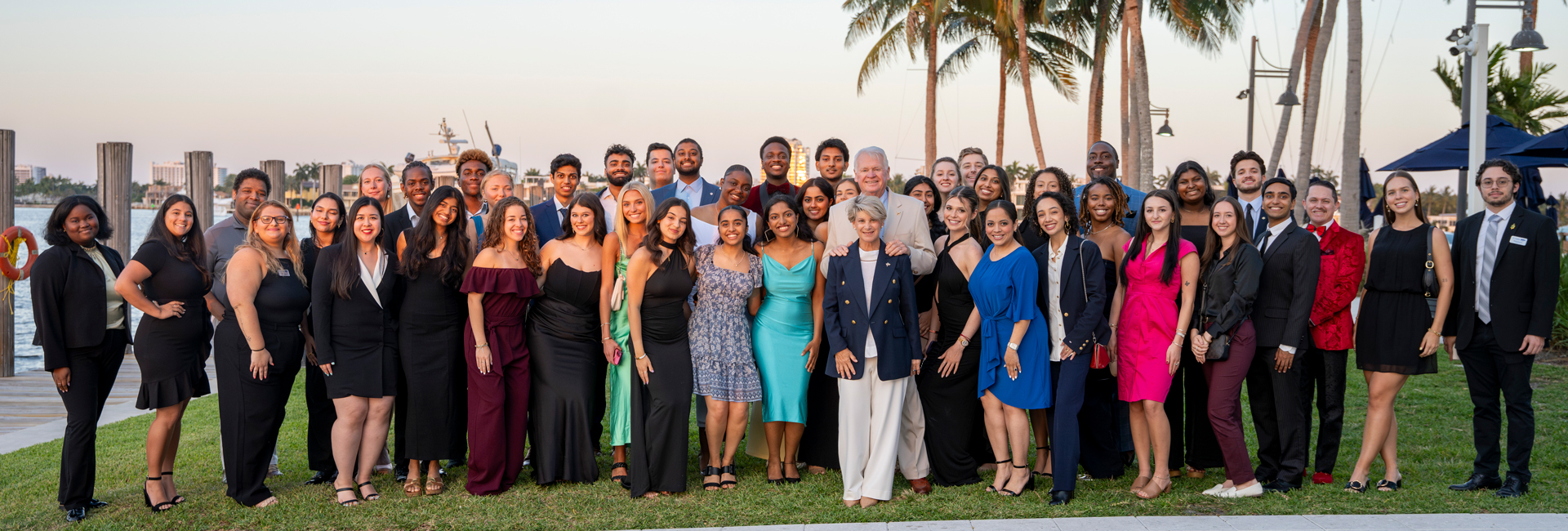The Center for Student Leadership and Global Engagement at Nova Southeastern University is dedicated to a student-centered approach to leadership and community engagement. We empower students to become active, empathetic, and collaborative leaders who can create positive change both on campus and in the world.
Our Core Values
- Experiential and Transformative Learning
- Responsiveness to Current Issues
- Reflection and Personal Growth
- Emotional Intelligence and Collaboration
- Active Citizenship and Social Change
Our Mission
The Center for Student Leadership and Global Engagement empowers students through leadership development, community-based learning, and global experiences that foster critical thinking, cultural understanding, and a drive to lead the change and shape the world.
Engaging with the Center for Student Leadership and Global Engagement offers students a pathway to develop leadership skills, participate in meaningful service, and become active, informed citizens both locally and globally.
Whether you're exploring leadership opportunities, engaging in the Fort Lauderdale community, or planning a global experience, the Student Leadership and Global Engagement offers countless ways to make your mark. Find us on the first floor of the Student Affairs Building in Suite 106.
The Student Leadership and Global Engagement is your hub for leadership and global opportunities at NSU. We provide a wide range of programs and resources, including:
- Leadership Development: Leadership training, the Razor's Edge Leadership Scholars Program, Student Leadership Recognition, and the annual LEAD Week Conference.
- Community Engagement: Days of Service, Alternative Service Break Trips, Community Service Fairs, and co-curricular experiential education units.
- Student Support: Registered Student Organization (RSO) support, a wide range of community affiliates for service projects, and support for the Undergraduate Student Government Association.
- Global and Cultural Programs: International Education Week, cultural celebrations and programming, and the Sharks Abroad program.
Leadership Development Trainings
The Center for Student Leadership and Global Engagement offers a variety of leadership development training designed to build leadership capacity within the NSU community.
If you’re interested in requesting a training for your student leaders, student employees, Registered Student Organization, or even a group of friends, please review the available topics below.
|
Topic/Title of Workshop |
Learning Outcomes |
|
Chill Vibes |
Participants will discover ways to build a friendly and respectful atmosphere where members can connect, feel supported, and enjoy meaningful shared experiences. |
|
Doesn't Anyone Listen to Me? Effective Communication |
Participants will learn what barriers can contribute to poor communication and develop strategies to communicate more effectively. |
|
Why So Mad? Emotional Intelligence |
Participants will understand that recognizing and appropriately expressing their emotions can positively influence their leadership impact. |
|
Event Planning and Logistics |
Participants will explore event planning from inception to execution, with an emphasis on early preparation, understanding member interests, identifying target audiences, and considering key event characteristics |
|
Lost In the Sauce. Engaging Your Members |
Participants will discover practical ways to engage every member of their organization by recognizing and responding to individual needs and motivations. |
|
Capitalizing On Difference In Your Organization |
Participants will explore how individual members’ life experiences, personalities, and leadership capacities influence the success of their organization. They will take away actionable best practices to ensure that differences within the group become strengths that drive success. |
If you would like to request personalized training, please do so by completing this form:
https://opinio.nova.edu/opinio/s?s=21310
A member of our leadership team will contact you within two business days to discuss your request, clarify your needs, and understand the outcomes desired for your area. If you do not receive a response within that timeframe, please reach out to us at studentleadership@nova.edu.

Contact Us
Center for Student Leadership and Global Engagement
Nova Southeastern University
Student Affairs Building, Suite 106
3300 S. University Drive,
Fort Lauderdale, FL 33328-2004
Main Office:
(954) 262-7195
studentleadership@nova.edu
Hours of Operation:
Monday - Friday 9:00 a.m. – 6:00 p.m.

